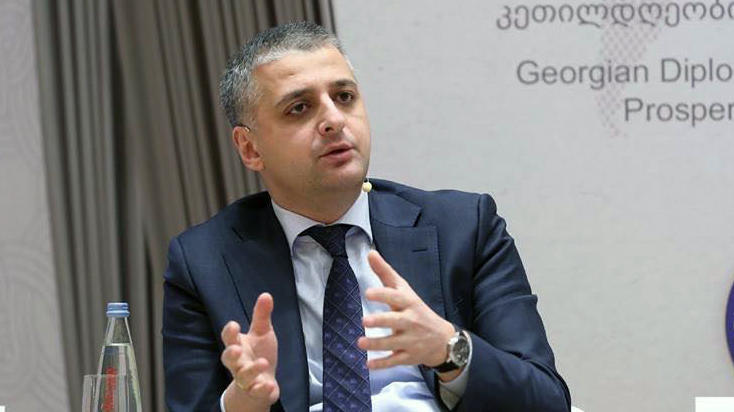The EU and Gazprom
A couple of weeks ago, something happened that was largely ignored or misunderstood by the Georgian press. The EU formally said Russian Gazprom has been breaking EU competition law, which of course it has. Most countries that rely so heavily on oil, gas and other extractive industries are much smaller and poorer than Russia. Most countries that can, work hard to persify their economy to make it more resilient, but Russia has not. For such a big country, Russia is very very reliant on gas and oil.
At the same time, because of its unique history, particularly the legacy of communism, the Kremlin doesn’t tend to understand or agree with the separation of government and business and the need for competition. Gazprom is controlled by the Kremlin, and acts not in the
interest of the shareholders, or in accordance with normally accepted rules of fair competition, but in accordance with the wishes of the Kremlin. Using gas prices and supply it rewards countries that does what it wants and punishes those that don’t. The Kremlin thinks this
is normal and natural but it violates not only EU law, but the laws of all developed countries.
Particularly after the 2008 war in Georgia, the EU began to worry more about the Kremlin and particularly about the Kremlin’s main instrument in the EU, gas supply. There was little to be gained by a political response which would have been difficult anyway. But the real strength
of the EU is law and the part of the EU that oversees its laws, the European Commission. On 27 September 2011, the Competition Commission conducted sting operations in dozens of Gazprom offices throughout the EU. They simply entered the offices with warrants and copied the hard drives of all the computers, an incredible volume of information. It was and is the largest anti-trust operation in EU history. The Kremlin went crazy but the EU said nothing, simply that they were responsible for monitoring anti-competitive behavior within the EU and so they were doing that. A year later they announced that they were opening a formal investigation against Gazprom.
At the same time over the last decade, there has been many investigations of other companies, of Microsoft and most recently of Google. This gave the EU the ability to say that they are impartial. There will be a settlement with Google just as there was with Microsoft. But the EU can fine anti-competitive behavior for up to ten percent of revenues, which in the case of Gazprom would be up to ten billion Euros.
Several days ago on, April 22, Margrethe Vestager, the EU’s current Commissioner for Competition, announced the results and charged Gazprom with violation of EU law in five countries: Estonia, Latvia, Lithuania, Poland and Bulgaria. The prices for gas are all over the place, with the Bulgarians and Czechs who helped Ukraine after the invasion paying more than most, with Hungary and Slovakia who were friendly to the Kremlin paying less. To Putin, this is simply using the tools at his disposal. But in the EU this is illegal.
There were some in the EU who wanted to cut a deal with Gazprom and there we¬re discussions of a quiet agreement, but Gazprom refused, and with events in Ukraine, few in Europe see much hope or future for discussions or negotiations with Russia. So, one week after bringing up
charges against Google, the Commissioner read the charges against Gazprom. They have twelve weeks to reply formally, but have already informally made comments that they don’t think the EU has jurisdiction, which is not correct.
So what does all this mean? The EU has been slow to deal with these issues, because Gazprom and the Kremlin have been fairly effective in piding the EU countries on their energy and Russia policies. But the European Commission is one entity, has very serious prosecution powers and isn’t particularly interested in national habits or arrangements with Gazprom. Gazprom supplies a quarter of the EU’s gas, but the global gas prices are very low now and are likely to stay that way now that the U.S. is producing so much. There are increasing numbers and volumes of liquified natural gas terminals and plans for them around the world and in Europe. The EU badly needs a common energy policy and this is a way to move in that direction, so that the EU can decide how it wants to buy and move gas by itself rather than with Gazprom dictating terms. In the end, Russia is more dependent on Europe as a customer than vice versa. The EU is not strong politically yet, but it takes the rule of law seriously.
During the Soviet period, the USSR was almost completely isolated from the world economy and that isolation was an important part of its end. Now Russia, through Gazprom, tourism, the international banking system, and many other larger and smaller systems and entities, is
much more connected to the rest of the world. These connections require that it play by the rules, which it keeps refusing to do. But these connections, along with the wealth and benefits Russia gets from them also make it vulnerable to being held to the same standards that others are held to. More and more those connections will be looked at and used to encourage Russia to be a more responsible member of the international community. And if not, to at least play by the rules it has benefited so much from.
Author: Mark Mullen
